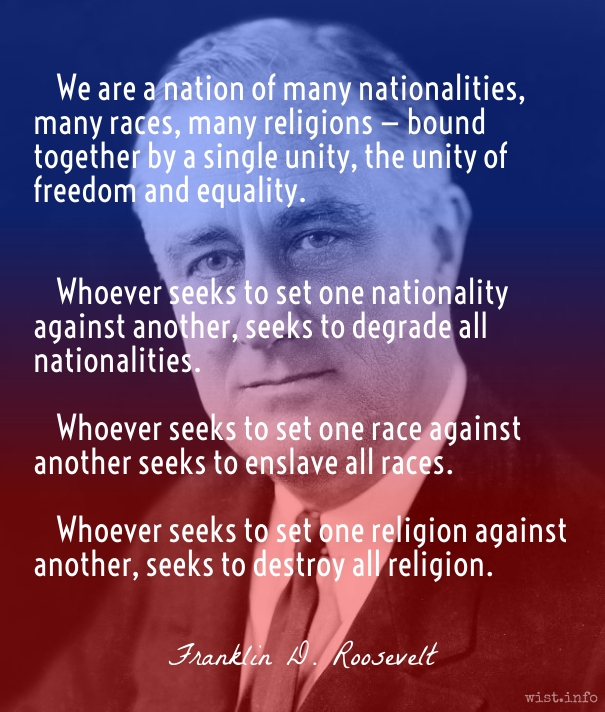Of one man in especial, beyond any one else, the citizens of a republic should beware, and that is of the man who appeals to them to support him on the ground that he is hostile to other citizens of the republic, that he will secure for those who elect him, in one shape or another, profit at the expense of other citizens of the republic. It makes no difference whether he appeals to class hatred or class interest, to religious or anti-religious prejudice. The man who makes such an appeal should always be presumed to make it for the sake of furthering his own interest.
Theodore Roosevelt (1858-1919) American politician, statesman, conservationist, writer, US President (1901-1909)
Speech (1910-04-23), “Citizenship in a Republic [The Man in the Arena],” Sorbonne, Paris
(Source)
Quotations about:
divisiveness
Note not all quotations have been tagged, so Search may find additional quotes on this topic.
We are a nation of many nationalities, many races, many religions — bound together by a single unity, the unity of freedom and equality. Whoever seeks to set one nationality against another, seeks to degrade all nationalities. Whoever seeks to set one race against another seeks to enslave all races. Whoever seeks to set one religion against another, seeks to destroy all religion.
We must scrupulously guard the civil rights and civil liberties of all citizens, whatever their background. We must remember that any oppression, any injustice, any hatred, is a wedge designed to attack our civilization.
Franklin Delano Roosevelt (1882-1945) American lawyer, politician, statesman, US President (1933-1945)
Letter to William Allan Neilson (1940-01-09)
(Source)
Neilson was the co-chair of the Sponsor Committee, Fourth Annual Conference of the American Committee for Protection of Foreign-Born. It was read to the conference on 1 March 1940, and entered into the Congressional Record (along with other letters received) on 11 March.
About two years later, 19 February 1942, FDR signed Executive Order 9066, authorizing the evacuation of all persons (which largely meant Japanese-Americans) deemed a national security threat from the West Coast to internment centers further inland.



